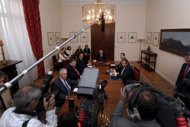Greece faces repeat elections as coalition talks collapse

The new polls, expected on June 17, follow an inconclusive election on May 6 when a majority of Greeks voted against harsh austerity measures Athens took on in return for a massive EU-IMF bailout late last year.
"We are going again towards elections, in a few days, under very bad conditions," socialist Pasok party leader Evangelos Venizelos said, regretting the fact that there was no accord.
"The Greek people must now make the right decisions for the good of the country," said Venizelos, who supported the 240 billion euro ($310 billion) rescue deal in a technocrat government formed last November.
European stocks slumped on the news and the euro tumbled below $1.28, a four-month low.
But Athens got support late Tuesday when German Chancellor Angela Merkel and new French President Francois Hollande, meeting for the first time, said they wanted Greece to stay in the euro.
Merkel added that the two top eurozone economies were prepared "to study the possibility of additional growth measures in Greece" if Athens said they needed them.
Meanwhile, talks with all political parties will be held at 1000 GMT Wednesday on setting up a caretaker administration, Greek President Carolos Papoulias's office said.
With no guarantee that Greece's second elections in less than two months weeks will produce a viable government, the prospects now are for prolonged volatility and uncertainty over the future of the eurozone.
International Monetary Fund head Christine Lagarde raised the possibility that Greece could leave the currency union, but also offered hope that some details of the bailout could be looked at again.
"If the country's budgetary commitments are not honoured, there are appropriate revisions to do, which means either supplementary financing and additional time or mechanisms for an exit, which in this case must be an orderly exit," Lagarde said in an interview with France 24.
"It is something that would be extremely expensive and would pose great risks but it is part of options that we must technically consider," she said.
"They have undertaken important reforms, they have made a certain number of sacrifices," Lagarde said. "To throw all of this away because of profound political disagreements, it's really a shame for the Greek people."
"I hope that a compromise solution will be found that will allow progress within the respects of a programme that of course we will be open to examining on details, not on the fundamentals," she said.
German Foreign Minister Guido Westerwelle said the collapse of the coalition negotiations was a "severe setback for the urgently needed confidence in Greece's readiness to reform".
Papoulias had called Tuesday's meeting after talks Monday with the conservative New Democracy, Pasok and radical Democratic Left parties failed to reach an accord on a coalition government.
He had suggested that in the absence of any other solution, a government of "distinguished and non-political figures" should be considered to break the impasse over the spending cuts, which have triggered deep anger and sometimes violent protests.
Success would have seen a return to the technocrat solution of November when former central banker Lucas Papademos, supported by New Democracy and Pasok, pushed through the EU-IMF bailout which staved off Greek bankruptcy.
It would also likely have helped ease strains over Greece's future in the 17-member eurozone but now everything is up in the air again while the economy remains mired in recession for a fifth year.
Figures issued Tuesday showed the Greek economy slumped a massive 6.2 per cent in the first quarter.
"Investors are pricing in a Greek exit from monetary union with a risk that it could turn out to be disorderly," said VTB Capital analyst Neil MacKinnon.
Mike McCudden at Interactive Investor said Greece posed a problem of contagion for other weaker eurozone members, namely Spain and Italy, as Europe sees "a general backlash against austerity measures".
There can be little doubt about the gravity of the situation both for Greece, if it has to leave the eurozone, and for its partners, who might lose billions in a disorderly withdrawal from the bloc.
France would face a bill of 50 billion euros if Greece were forced to quit, outgoing finance minister Francois Baroin warned.
Charles Dallara, who as head of the Institute of International Finance helped negotiate a private creditor debt write-down for Greece, warned that the cost of failure would be too high to bear.
"I believe that the cost to Greece, the cost to Europe and the cost to the entire global economy may still be enough to cause Greek politicians and European politicians to pause before they pull the trigger on a Greek exit."
What the stars mean:
★ Poor ★ ★ Promising ★★★ Good ★★★★ Very good ★★★★★ Exceptional
Related Contents
Latest News
More News
- Russian President congratulates Vietnamese Party leader during phone talks (January 25, 2026 | 09:58)
- Worldwide congratulations underscore confidence in Vietnam’s 14th Party Congress (January 23, 2026 | 09:02)
- Political parties, organisations, int’l friends send congratulations to 14th National Party Congress (January 22, 2026 | 09:33)
- 14th National Party Congress: Japanese media highlight Vietnam’s growth targets (January 21, 2026 | 09:46)
- 14th National Party Congress: Driving force for Vietnam to continue renewal, innovation, breakthroughs (January 21, 2026 | 09:42)
- Vietnam remains spiritual support for progressive forces: Colombian party leader (January 21, 2026 | 08:00)
- Int'l media provides large coverage of 14th National Party Congress's first working day (January 20, 2026 | 09:09)
- Vietnamese firms win top honours at ASEAN Digital Awards (January 16, 2026 | 16:45)
- ASEAN Digital Ministers' Meeting opens in Hanoi (January 15, 2026 | 15:33)
- ASEAN economies move up the global chip value chain (December 09, 2025 | 13:32)

 Tag:
Tag:




















 Mobile Version
Mobile Version